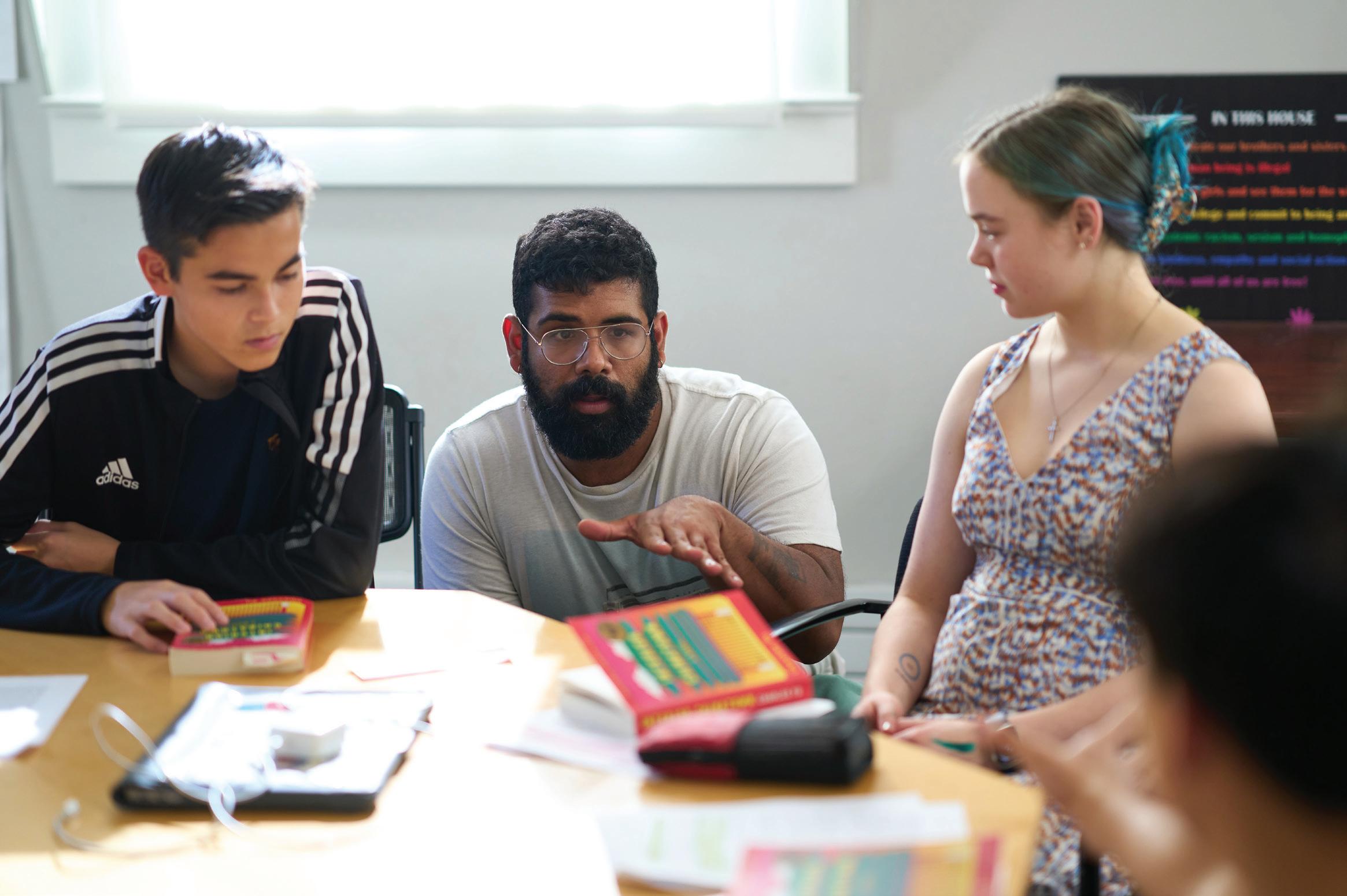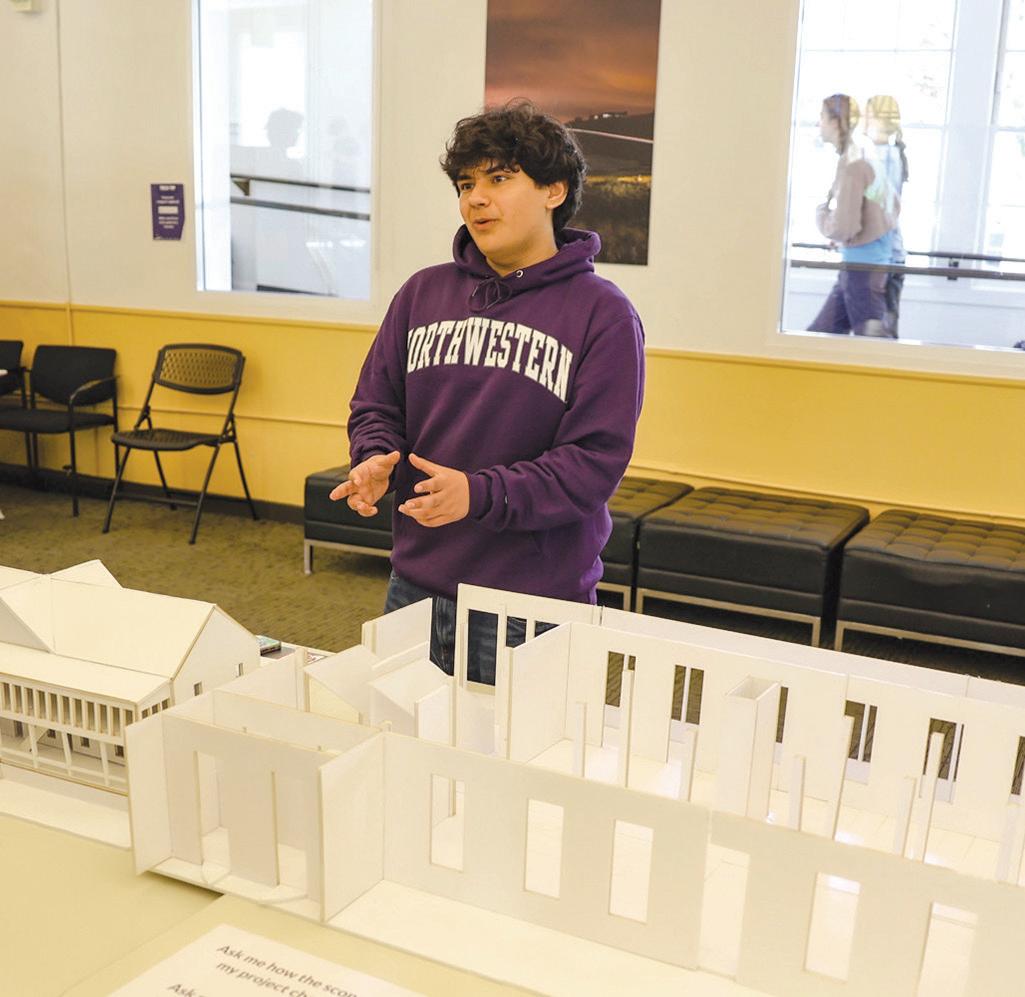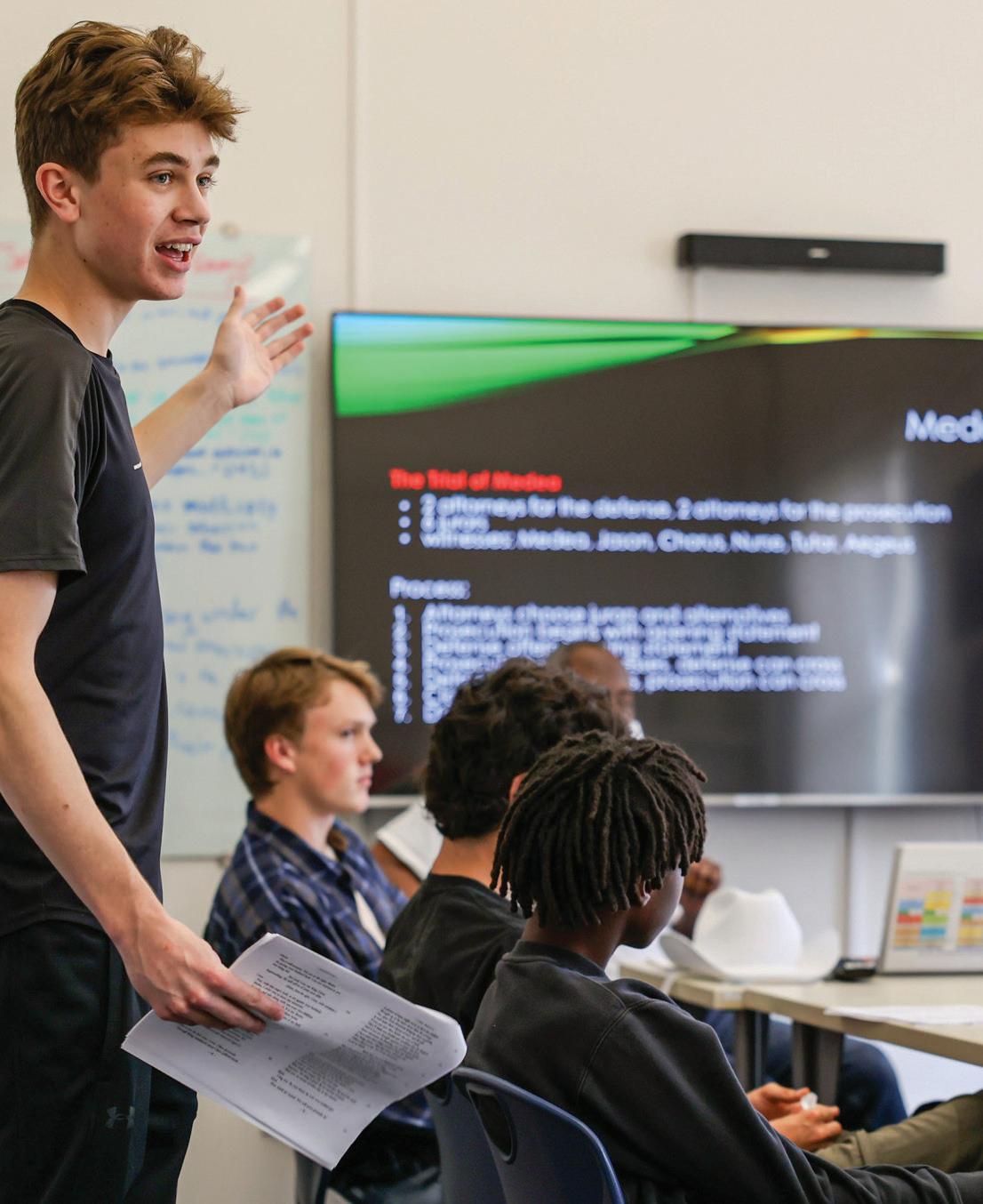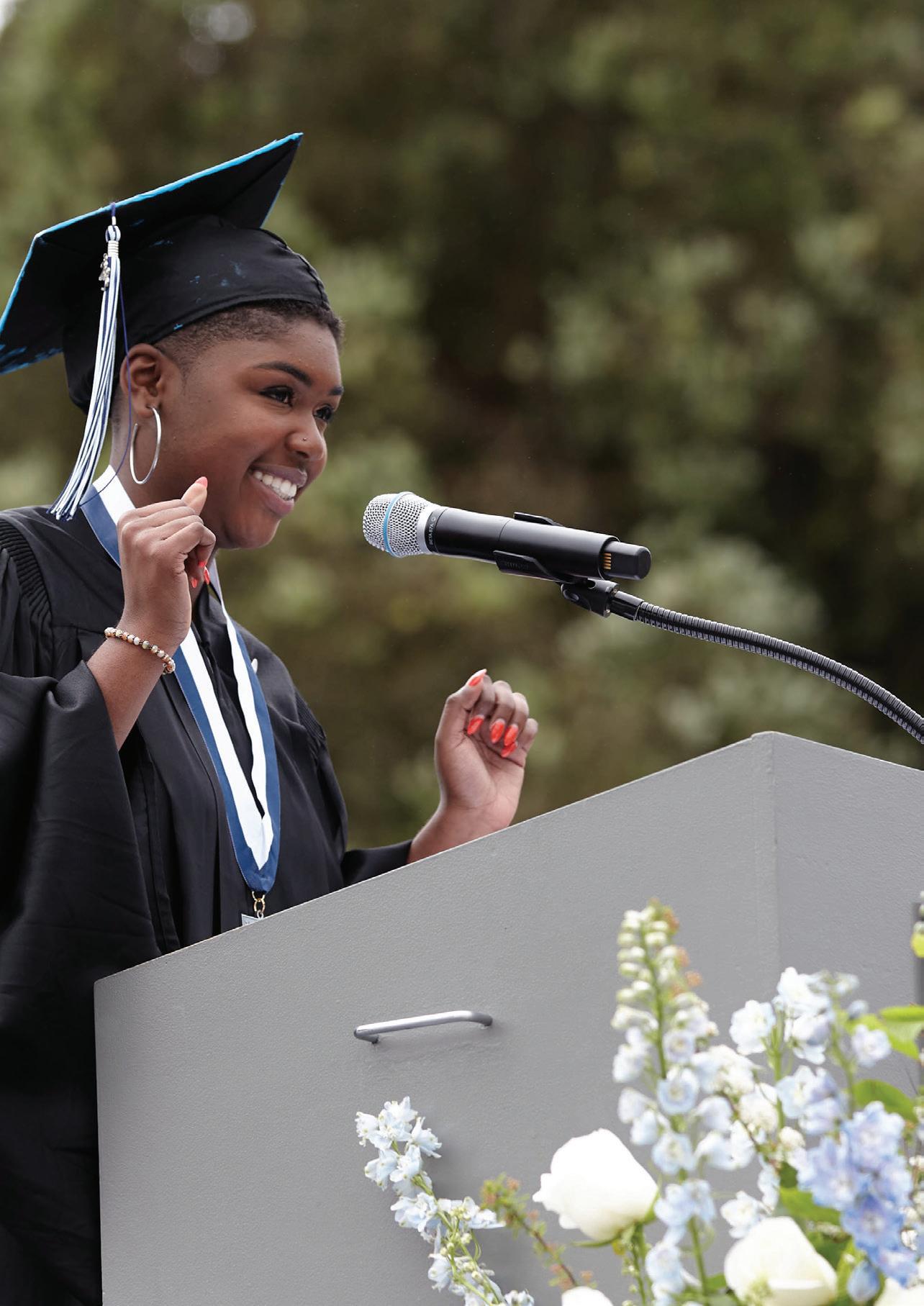+academics curriculum 2025–2026
OUR MISSION
At The Bay School, we balance challenging academics and innovative thinking with a mindful approach to learning and life. Our goal is to see students unlock their individual and collective potential so they begin to realize their roles in a dynamic world.
Bay’s program develops students into sophisticated, ethical thinkers. Our teaching continually encourages students to go further, always asking, How? Why? Is there a better way? The schedule—with long blocks during semesters and threeweek Immersive terms—reflects the value we place on digging into complex ideas, engaging in deep discussions, and collaborating on a path forward. Everything we do reflects our mission to provide a rigorous academic experience with “a mindful approach to learning and life.”
Our alumni have gone on to create their own interdisciplinary majors in college, pursue PhDs and Fulbright scholarships, and start companies. From a strong foundation, you can take big leaps.
So let’s get started.
Your Path
At Bay you get to carve an academic path that speaks to your interests—the ones you have now and the ones you’ll discover along the way.
Academic progression at Bay is focused on building the skills and analytical abilities that allow you to take control of your learning and develop the confidence to challenge yourself. Your 9th and 10th grade schedules contain core academic courses and electives. In 11th and 12th grades, you get to focus on the subjects that fire up your interest, building your schedule from a wide choice of specialized courses in every subject area.
You can explore exciting course offerings like the post-Calculus pairing of Linear Algebra and Quantum Mechanics humanities courses like Banned Books and U.S Foreign Policy. Our courses are challenging but at Bay, academic rigor isn’t about relentless pressure— it’s about purposeful design.
We’re excited to offer pathways through our academic program that inspire your intellectual curiosity and push you to explore your potential. This guide will help you imagine what your own path at Bay could look like. After the course listings, you’ll find information about Bay’s approach to teaching and learning.


The Bay School Year
The school year at Bay is divided into four terms: fall semester, winter Immersive, spring semester, and spring Immersive. During semesters, you’ll take five classes. During Immersives, you’ll take one class for three weeks.
Daily Schedule: Semesters
Our day begins at 8:30 a.m. We have Morning Meeting on Mondays, Wednesdays, and Fridays—it’s as important as class time. Advisory groups meet on Tuesdays or Thursdays, and tutorial and after-school activities take place three days a week. Sports teams practice or play five days a week throughout the school year.
Bay’s schedule offers the gift of balanced time. Longer class blocks during semesters give teachers flexibility to create varied class structures, with time for both discussion and collaborative project work. “Flex” blocks and tutorial give students time during the school day to do homework and meet with teachers.
Daily Schedule: Bay Immersives
We switch it all up for Immersives. The official school day runs from 9 a.m. to 3 p.m., but many classes are held off-campus or do extended field study. Some courses—like Water in the American West—include travel within the United States.
Bay Immersives
This program is the only one its kind in California, and one of just a handful in the United States. Immersives are experiential courses designed to take advantage of the unique three-week format. You spend each day with your classmates, learning intently and then planning and creating your final project.
Some courses are interdisciplinary, like Museum Studies, and some are focused on one topic, like Biotechnology. On the last day of each Immersive term, you present your final project. The weeks are intense, and you’ll come away seeing that school can be exhilarating. Here’s what can happen in those three weeks:
In Assembling San Francisco, you’ll spend most days out in the field, from the City to Point Reyes, studying the unique geological features that have created the Bay Area.
In Civil Rights in the American South, you’ll journey through some of the significant places in the American Civil Rights Movement, learning about the people and events of those locations.
And the possibilities go on. Different from the experiential terms offered at some schools, Immersives are UC-approved academic courses that are required for graduation.
Honors Courses
Whether you’re learning to derive and proof your own equations in Physics 2 or collaborating on a project about Confucianism in Comparative Philosophy, you’ll get next-level challenge in Bay’s honors courses.
Honors courses let students who are academically ready for college-level work drill down into subjects of interest. You’ll see the wide range of options in the course list on the following page. To take these courses, Bay students must get approval from their current teachers and their advisor, as these classes are designed to challenge students to push themselves in new intellectual directions.
Honors classes are developed by expert Bay faculty and reflect our commitment to depth over breadth. The Advanced Placement model, with its emphasis on memorization, does not provide the depth and interdisciplinary perspective that distinguish a Bay education. For this reason, we do not offer AP courses.

“Bay’s variety of courses really let you explore your interests in depth. My honors science classes and the Wilderness First Responders Immersive allowed me to understand more about the STEM fields, and assured me of what I wanted to study in college.”
—Nathalia G. Class of 2024
2025-2026 COURSE OFFERINGS
FALL SEMESTER: AUGUST 18–NOVEMBER 20, 2025
SPRING SEMESTER: JANUARY 12–MAY 5, 2025
= interdisciplinary
ARTS
The Creative Process (9th grade requirement)
Design 1A-1B
Drama 1A-1B
Drawing 1A-1B
Jazz 1A-1B
Music Production 1A-1B
Painting 1A-1B
Photography 1A-1B
Video Production 1A-1B
Vocal Music 1A-1B
Advanced Design
Advanced Drama: Directing and Script Analysis
Advanced Drawing and Painting Studio
Advanced Projects in Digital Arts
Advanced Vocal Music
Artist as Activist
Jazz 2
Yearbook
HUMANITIES CORE
Humanities 1A-1B (9th grade)
Humanities 2A-2B (10th grade)
Civics (10th grade)
American Studies (11th grade)
ENGLISH
American Rage
Asian American Literature
Banned Books
Breaking the Singular Story
British Literature
The Craft of Writing
Essay and Memoir
Indigenous American Literature
The Good Life
= honors
MATH
Math 1A-1B
Math 2A-2B
Math 3A-3B
Analysis of Functions
Calculus
Computer Science 1 & 2
Group Theory
Linear Algebra
Statistics
Topology
Using Data Science to Explore Social Issues
RELIGION/PHILOSOPHY
Comparative Philosophy
Comparative Religion
Ethics and Ethical Decision Making
The Good Life
SCIENCE
Conceptual Physics 1A-1B
Biology 1A-1B
Chemistry 1A-1B
Astronomical Research Seminar
Biological Psychology
Biology 2
Chemistry 2
Earthquakes and Volcanoes
Evolutionary Biology
Human Genetics and Disease
Human Physiology
Power Generation: Transitioning from Fossil Fuels to Renewable Energy
Physics 2
Quantum Mechanics
Sustainability and Earth Systems
SENIOR PROJECTS
There is a makers’ section for those doing product design or engineering projects. Juniors may opt to start SPs in their spring semester with teacher permission.
SOCIAL STUDIES
African Studies
Artist as Activist
Ethical Economics
Ethnic Studies: Race, Class, and Gender
Human Geography
Queer History
U.S. Foreign Policy
WORLD LANGUAGES
Mandarin 1–4
Mandarin 5
Advanced Topics in Mandarin Spanish 1–4
Advanced Topics in Spanish: Literature and Culture
Spanish for Spanish Speakers 1–2
Spanish for Spanish Speakers 3
9TH GRADE
Assembling San Francisco: Geology of the Greater Bay Region
Bird Nerds: Flight and Field Ornithology
How Can We All Get Along?
Infinite Geometries: The Art of Islam
The Mathematics of Digital Animation
10TH GRADE REQUIREMENT
Humanities 2: Students take a course for English credit focused on the skill of public speaking. Options include:
• Fiction on the Page and Stage
• Rhetoric and Debate
• Shakespeare Unbound
• Spoken Word Poetry
11TH AND 12TH GRADE BY SUBJECT
ARTS
Modern American Family Museum Studies
Technical Theater
ENGLISH
Essential Questions Through Film
Futures Past and Present
Modern American Family
Stories of San Francisco
RELIGION/PHILOSOPHY
Buddhism
SCIENCE
Applied Chemistry: Better Cooking Through Chemistry
Astronomy: Observatory
Construction Techniques
Cybersecurity and Ethical Hacking
Marine Biology
Wilderness First Responder
SOCIAL STUDIES
Museum Studies
Poverty and Justice
SPRING IMMERSIVES: MAY
9TH GRADE REQUIREMENT
Humanities 1: Students take a course for English credit that builds skills in research, empathy, and examining Bay Area dynamics around identity. Options will include
• Secrets of the City: Exploring San Francisco’s Hidden Histories
• Sights, Sounds, and Flavors: Exploring the Soul of the San Francisco Bay Area
• Summer of Love: The Rebels, Dreamers & Change-Makers of 1967
10TH AND 11TH GRADE BY SUBJECT
ARTS
Filmmaking
The Art and Science of Bicycle Fabrication
ENGLISH
Civil Rights in the American South
The Writer’s Life: A Creative Exploration
SCIENCE
Atmospheric Science and Engineering: Launching Near-Space Weather Balloons
Biotechnology (11th grade only)
California Geology: A Field Experience Fire Ecology
The Geologic, Environmental, and Human History of the California Gold Rush Water in the American West: The Eastern Sierra Nevada
SOCIAL STUDIES
Bay Area Culture: The Evolution of Food Civil Rights in the American South
The Geologic, Environmental, and Human History of the California Gold Rush Water in the American West: The Eastern Sierra Nevada
WORLD LANGUAGES
Spanish Language & Community Engagement, History, and Culture in Guatemala
CO-CURRICULAR REQUIREMENTS
10th Grade—1 semester of Choices (health, wellness and relationships)
College counseling: 2 semesters (spring of 11th grade–fall of 12th grade)

The Project Arc
We believe in the importance of sustained project work: It gives students consistent practice in long-term project management, ideation, iteration, and learning how to change course when needed. We intentionally build these skills in our four-year curriculum arc. Students become resilient in responding to setbacks and gain the knowledge that there is usually more than one way to solve a problem.
THE CREATIVE PROCESS
Required for all 9th graders, this course creates a reliable foundation for problem solving. Using design-thinking principles, you’ll learn the processes of identifying and researching problems, coming up with solutions, and testing and refining them.
CAPSTONE: Will you make an app to help other new students find their way around campus? Reinterpret a classical piano composition? Try to reinvent the wheel? These are real projects that Bay 9th graders have completed in The Creative Process.
CIVICS
All 10th graders take a semester of Civics, in which you learn about the structure of government on the local, state, and national level. Digging into current events and the history of many controversial topics, you explore the role of government in our lives. Media literacy and
evaluation of information sources are key components of the course, as you are challenged to think of ways you can become an informed civic actor within society.
CAPSTONE: Working in teams, you’ll spend much of the semester creating a podcast— complete with expert guests—on one of the topics covered during the course.
BIOLOGY
Biology is taken in 11th grade, and in spring semester you’ll come to the science milestone in the project arc, when you demonstrate your accumulated knowledge from physics (9th grade), chemistry (10th grade), and biology.
CAPSTONE: You’ll select a topic related to climate change’s impact on living systems, design the project, conduct research, and develop a comprehensive lab- or researchbased report. A few recent examples:
• Why Fog Is Vital for the Redwoods of Northern California
• The Olympics and Their Carbon Footprint
• Mangroves and Their Role in Countering Climate Change
• Alternatives to Palm Oil in Consumer Products from Lipstick to Nutella
SENIOR PROJECTS
Now let’s put it all together. Over the course of two semesters, you will: propose a project with defined goals, work with a community mentor, and execute the final product. You will encounter obstacles, twists and turns, and probably some failure. But you’ll analyze problems along the way, change methods or even the goal, and keep going.
A (very) short list of recent senior projects:
• A system for prison inmates to play chess by mail with members of a San Francisco chess club
• An improved cargo system for bike commuters
• A working prototype of a handheld light that does not require batteries
• A solar-powered battery for small boats

Bay Essentials

The Bay School stands out for its emphasis on real-world skills paired with rigorous intellectual inquiry. In a world where “content” is at our fingertips, our students develop the tools to navigate a dynamic world, particularly focusing on research, credibility of sources, informed debate, and articulating ideas.
The coursework and structure for every Bay class is designed to help impart six crucial transferable skills: communication, collaboration, academic skills and responsibility, critical thinking, creative thinking and risk-taking, and ownership of learning. In addition, we have three learning areas in which all Bay students focus:
ETHNIC STUDIES
We believe every Bay graduate should have the skills and experience of learning about and discussing complex topics around identity, race, and ethnicity. Rather than prescribing a single course all students must take, we offer a menu for students to choose from; the options include semester courses, like Asian American Literature and African Studies, as well as Immersives like Civil Rights in the American South and The Geologic, Environmental, and Human History of the California Gold Rush.
PUBLIC SPEAKING
In their December Immersive, sophomores take a course focused on developing their public speaking and/or performance skills. Students have choices in how they practice this skill, with offerings like Spoken Word Poetry and Negotiation, Legislation, and Debate
From presentations to Socratic seminars to exhibitions, the emphasis on clear and confident communication is woven into our academic program.
PHILOSOPHY OR RELIGION
All Bay students take at least one elective course (semester or Immersive) that interrogates complex ideas that help us understand our broader communities, whether local, national, or international. Students can choose from offerings like Ethics, Existentialism, Comparative Religion, and Religion in U.S. Politics. Each of these courses explores the relationship between the self and society with a goal of deepening our understanding of others.

Future Forward
Why do more than 180 colleges and universities visit Bay every year?
Because they know our graduates to be inventive, thoughtful, and exceedingly well-prepared.
Our experienced, dedicated college counselors guide every student in finding the path that is right for them, and our graduates go forward with courage and confidence.
College Matriculations 2021–2025
Agnes Scott College
American University
Amherst College
Arizona State University
Babson College
Bard College
Barnard College
Bates College
Bennington College
Boston College
Boston University
Bowdoin College
Brown University
Bryn Mawr College
Bucknell University
California State Polytechnic University, Humboldt
Cal Poly San Luis Obispo
California State University, Channel Islands
Cal State Long Beach
Cal State Sacramento
Carleton College
Carnegie Mellon University
Case Western Reserve University
Chapman University
City College of San Francisco
Claremont McKenna College
Clark University
Colby College
Colgate University
College of Marin
Colorado College
Colorado State University (Fort Collins)
Columbia University
Connecticut College
Contra Costa College
Cornell University
Cornish College of the Arts
Dartmouth College
Davidson College
Denison University
Drexel University
Duke University
Eckerd College
Elon University
Embry-Riddle Aeronautical University (Daytona Beach)
Emerson College
Emory University
Fordham University
George Mason University
George Washington University
Goldsmiths, University of London
Gonzaga University
Grinnell College
Harvey Mudd College
Haverford College
Hobart and William
Smith Colleges
Howard University
Illinois Wesleyan University
Indiana University (Bloomington)
Johns Hopkins University
Kenyon College
Lawrence University
Lehigh University
Lewis & Clark College
Loyola Marymount University
Loyola University Chicago
Macalester College
McGill University
Middlebury College
Montana State University
New York University
Northeastern University
Northwestern University
Oberlin College
Occidental College
Ohio Wesleyan University
Olin College of Engineering
Oregon Institute of Technology
Oregon State University
Pacific Northwest College of Art at Willamette University
Parsons School of Design at The New School
Penn State University (University Park)
Pepperdine University
Pitzer College
Pomona College
Portland State University
Pratt Institute
Princeton University
Purdue University (Main Campus)
Reed College
Rhode Island School of Design
Rochester Institute of Technology
Saint Joseph’s University
Saint Mary’s College of California
San Diego State University
San Francisco State University
Santa Clara University
Sarah Lawrence College
Savannah College of Art and Design
School of Visual Arts
Scripps College
Smith College
Southern Methodist University
St. Olaf College
Stanford University
Syracuse University
Texas Christian University
The American University of Paris
The Boston Conservatory at Berklee
The New School
The Ohio State University
The University of Edinburgh
The University of Tampa
The University of Texas at Austin
Trinity College
Trinity College Dublin
Tufts University
Tulane University of Louisiana
University of British Columbia, Vancouver
University of California
Berkeley
UC Davis
UC Irvine
UC Los Angeles
UC Merced
UC Riverside
UC San Diego
UC Santa Barbara
UC Santa Cruz
University of Chicago
University of Colorado Boulder
University of Denver
University of Georgia
University of Glasgow
University of Hawaii at Manoa
University of Maryland (College Park)
University of Miami
University of Michigan
University of New South Wales
University of North Dakota
University of Notre Dame
University of Oregon
University of Pennsylvania
University of Puget Sound
University of Richmond
University of Rochester
University of San Diego
University of San Francisco
University of Southern California
University of St Andrews
University of Toronto
University of Utah
University of Vermont
University of Virginia
University of Washington (Seattle)
University of Wisconsin (Madison)
Vanderbilt University
Vassar College
Villanova University
Virginia Polytechnic Institute and State University
Wake Forest University
Waseda University
Washington University in St. Louis
Wellesley College
Wesleyan University
Western Washington University
Whitman College
Willamette University
William & Mary
Worcester Polytechnic Institute
Yale University
